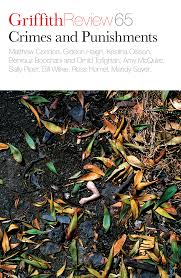Griffith Review is one of Australia’s leading publications for new writing, offering diverse voices in prose, fiction, essays, memoir and poetry. This latest quarterly edition: 65 Crimes and Punishments (Text Publishing 2019), edited by Ashley Hay, explores our endless fascination with crime stories, both true crime and fiction, and navigates the ideas of retribution, punishment, incarceration, justice, victims, perpetrators, witnesses and advocates.
Ashley Hay opens with an introduction on the ‘Fraught pursuit of justice’ through ‘retribution, reform and rehabilitation’, from the islands of Norfolk to Manus. Matthew Condon contributes a moving memoir piece about his own dark childhood memories and how they were exacerbated during his long investigative research into the scandal surrounding the Fitzgerald Inquiry. Bill Wilkie reports on the infamous Cedar Bay raid of the 1970’s, and several contributors have written insightful essays around crime, punishment, laws, the constitution, prison life, false confessions, recidivism and redemption. There are five fiction submissions: Beejay Silcox’s Gun; Lucy Sussex’s The Sin Room; Mandy Sayer’s Visiting Day; Patrick Allington’s Prepping; and Sally Piper’s except from her new work in progress Memorial Park, a beautiful piece that ties together nature and the emotional burden of grief. Catherine Ford writes movingly about the trauma of being a court transcriber. The issue of Aboriginal incarceration is examined with sensitivity and courage in several pieces. Two poignant photo stories are included. Gideon Haigh’s reportage ‘This is how I will strangle you’ is a terrifying, confronting and heartbreaking story of the torment of incest and the trail of survivors left in its wake. Poems punctuate the prose like sharp interruptions, asking the reader to connect in an entirely new way. The memoir pieces by Hayley Katzen, about the death of her stepmother and her ongoing search for answers, and Yen-Rong Wong’s personal tale of childhood physical punishment and the scars left behind, are tender and thoughtful and raw. Kris Olsson’s reporting on Debbie Kilroy and her unique method of micro-justice is empowering and impressive. The volume concludes with an essay on environmental crime by Karen Viggers and an enlightening conversation between Behrouz Boochani and his translator Omid Tofighian in discussion about borders and incarceration on Manus Prison. Once again, Griffith Review demonstrates why it is at the forefront of Australian literary experimentation, investigation and creativity.

